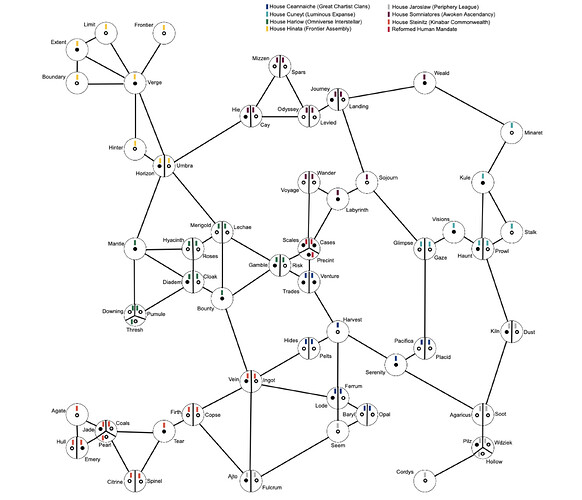What are the settings and stories that influenced this setting?
- The Expanse: a crew aboard a ship they’ve lovingly maintained follow a trail of clues on a system spanning conspiracy that opens the doorway to an unbelievable future.
- Battletech: a mercenary company pilots big battlemechs and gets its feet under it by returning a deposed noble to her throne, through a campaign of targeted, asymmetrical mech warfare.
- Mass Effect: now that I think of it, the one-sentence elevator pitch is the same as the Expanse. Andromeda has a similar story, but it’s also a “find a new home” story woven through it instead of just “man versus existential threat”.
- Monster Blood Tattoo: In an era of city states, monsters are kept at bay through a combination of private bounty hunters with alchemical powers and large government forces, but sometimes the worst monsters might be people.
- The Black Company: A band of mercenaries travel the globe on contracts and quests as much to get paid as to keep the flame of their precious heritage alive.
The common threads are travel and the importance of the mission (central tension). There’s also a thread of getting paid and uncovering secrets. Pretty standard adventuring fare, but it is clearly important that the “crews” be highly mobile and focused on a mission. Sometimes having a ship is important, sometimes it’s not relevant, but from story to story the environment always changes. I think we can replace “lair” with ship. This puts greater importance on ship upgrades than a lair’s and contact npcs are more likely to be members of the crew. Holdings are portions of the ship that have been designated for npcs to work out of. How much emphasis is placed on the crew versus the ship. The ship is really an aspect of character unto itself of the crew, so I think crews should be kept as a concept.
So let’s think of crew types. The common threads are that the work must be dangerous, the job is something the employers can’t or won’t do, and must be one-and-done contracts.
- Academics handle hazardous science either in a laboratory (with the illusion of safety) or out in the wilderness
- Assassins center around targeted, asymmetrical attacks meant to terrorize or destabilize a faction
- Bravos apply overwhelming force to intimidate and damage a target faction on behalf of another
- Cults worship search for powerful artifacts and grow a following of zealous devotees
- Hawkers: in short are vice dealers
- Shadows are thieves and spies that collect valuables and secrets for their patrons
- Smugglers move goods safely through blockades and other hazards
- Vigilantes are extralegal operatives who do what the law can’t or won’t do for the common good
Each shares the common thread of danger, missions, and say something about the world. There wouldn’t be vice dealing hawkers if the vices were legal and plentiful. Bravos would not exist without the need for overt, bloody violence. They’re all up to something extra-legal. There’s a tension, because if they are ever found out, they’ll be punished; most likely severely.
Okay, are there more setting appropriate ways to name and characterize these crew types?
- Academics work when the stuff they’re dealing with is hazardous, so we can leave that be.
- Assassins seems to focused a word for what they do, so some alterations should be made here.
- Bravos has a nice renaissance feel, but they need to evoke mercenaries or condottieri for sure.
- Cultists can work, as there are a multitude of faiths and no official state religion (any more).
- Hawkers this crew-book seems a little too sedentary on first glance, and may need alterations.
- Shadows are a classic trope of limited-engagement espionage and thievery, but I may want to open this open a bit more to include fixers or mediators with dirty tricks.
- Smugglers are great because they move things through danger, so already we’ve checked all the boxes
- Vigilantes have a tendency to get tied down, but a traveling band of extra-legal do-gooders may fit well
In a twisted sort of way, Assassins are really Fixers, who solve problems that are people. They remove elements of the employer’s business that are impending their line of work. They disappear problems. This is different from Bravos who make vicious shows of force that are meant to be seen (even if they are not), and shadows who are meant to steal knowledge and things. Assassins eliminate obstacles, so I suppose the term applies.
How does a hawker selling religion differ from a cult? They both operate similarly, and cults may be too mystical for the setting we’re going for. Religion certainly exists, but it’s viewed someone cynically by the system as just a ploy for profit.
Hawkers sell their own vice, while smugglers move someone else’s, but what really distinguishes these two “mover” crew types?

